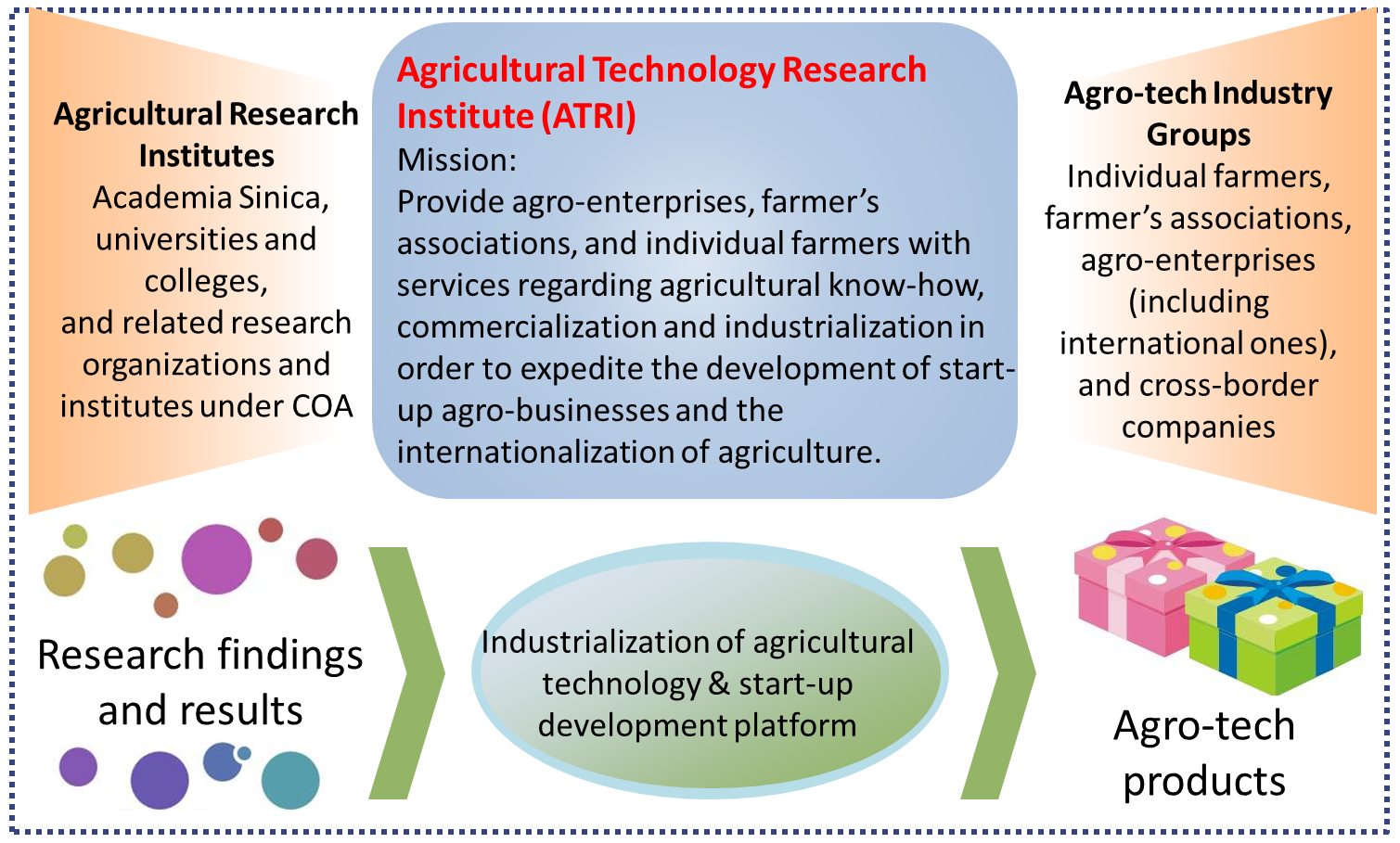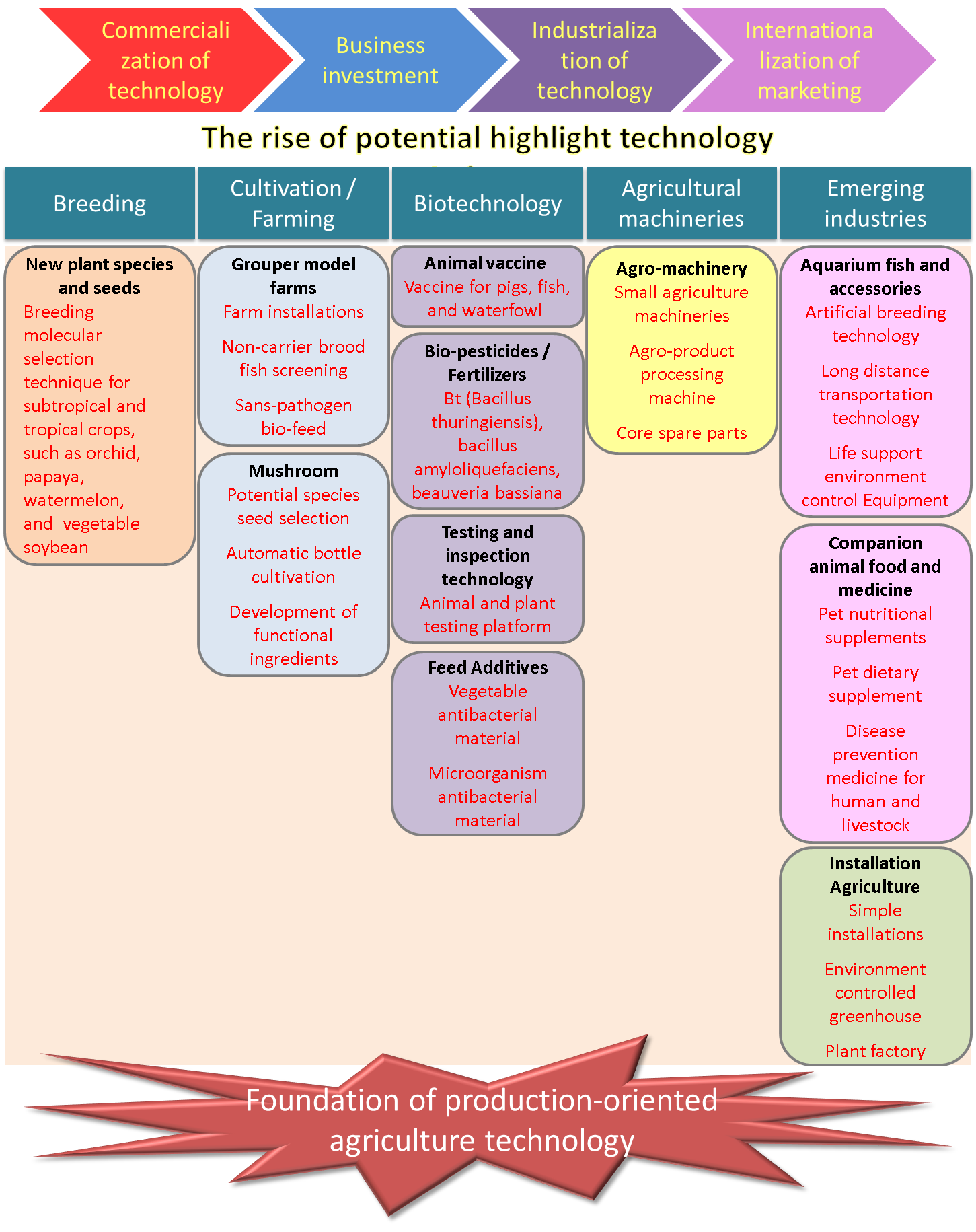Promotion of Technological Industrialization through Establishment of Agricultural Technology Research Institute (ATRI)
2015.2 (Issue No. 272)
I. Preface
Taiwan had obtained rather fruitful research & development achievements in the past, which played an important supportive role in Taiwan's economic growth. In recent years, free-trade has shifted from world trade organizations to regional or bilateral free trade agreements. In order to stay level with the fast-expanding regional economies and the rise of global bio-economies, Taiwan needs to be more open to possibilities and actively participate in the integration of regional economies. Taiwan's agriculture must elevate its competitiveness through creative thinking and actively transform itself into a value-added industry, thus creating high added value and extensive new business opportunities. This will lead to the internationalization of Taiwan’s agriculture and transform it into a highly competitive industry.
II. Industrialization of agricultural technology
To further assist Taiwan’s agriculture in its global expansion while strengthening the international competitiveness of agricultural technology and complementing the industry’s value chain with innovative agro-technology, the government established the Agricultural Technology Research Institute (ATRI) last year to promote the industrialization of agro-technology.
1. Establishment of ATRI
In order to promote the commercialization and industrialization of innovative agricultural research results, the Council of Agriculture (COA) established Agricultural Technology Research Institute (ATRI) on January 1, 2014. The ATRI in turn has established 3 research branches (Plant, Aquatic, and Animal Technology Laboratories), as well as Industrial Development Center and administrative departments. ATRI’s principle is to provide individual farmers, farmer’s associations, and agro-enterprises with services regarding agricultural know-how, commercialization and industrialization in order to expedite the development of new agro-businesses and the internationalization of agriculture. Its mission includes working closely with research laboratories and finding the valuable applications for agricultural R&D results, such as development and application of mass-production techniques, establishing specification standards, practicality assessment and analysis, intellectual property protection, brand design and marketing. Furthermore, the ATRI will offer counseling on technology transfer and commercialization, aiming to achieve the objectives of transforming the agro-tech industry into an innovative industry, while encouraging the cooperation between agro-enterprises and farmers in order to create an advanced agriculture.
2. Global logistics for agro-tech industry
From 2014 to 2017, the COA will select 10 agro-tech industries with international competitiveness potential based on global market and industry demand as well as Taiwan’s agricultural niche index, and then use the ATRI as a logistics platform to promote agro-tech R&D results value-added application and global expansion. 2015 saw the selection of 9 industries with international market potential including animal vaccine, feed additives, bio-pesticide, grouper model factory, testing and analysis, aquarium fish and accessories, new plant species and saplings, mushrooms, and agro-machinery. By integrating industry, academics, and research sectors’ resources, the COA hopes to strengthen the industry’s competitiveness, while finding more business opportunities and promoting the development of agro-tech industry through 8 strategies, namely industry development strategy analysis, agricultural incubation integration, industrialization and application of key technologies, added-value industry strategy, intellectual property positioning strategy, acceptance of research requests from abroad, counseling services for agro-tech enterprises, international marketing, and talent incubation.
3. Innovative thinking & enhancement of integrated interdisciplinary R&D
Taiwan enjoys many outstanding agricultural products and techniques such as value-added technology enhancement, integrated packaging and sales. Therefore, Taiwan possesses the capability to commercialize and industrialize agriculture related research findings and turn them into internationally competitive products.
In order to promote the commercialization and industrialization of agro-tech research findings, the ATRI will work in conjunction with research & extension centers under COA, as well as academic institutions in conducting researches and sharing resources. As an interdisciplinary cooperation R&D platform, the ATRI receives R&D results and findings from research centers under COA as well as academic institutions, and combines industrial, material, medical, beauty, food, information, cultural added-value applications to turn them into innovative agro-tech products. The COA hopes to elevate the overall agricultural added-value and set a new trend for agriculture.
ATRI’s incubation center also works with 4 other incubation centers under COA’s research institutes in offering introductory and final stages of training respectively. Depending on the needs of agro-enterprises, ATRI will assist them in obtaining R&D findings and offer them shared usage of COA’s research facilities as well as relevant technical and professional research assistance. Thus, ATRI hopes to fulfill the responsibility bestowed on it which is to achieve the goal of commercialization and industrialization for agro-tech R&D results and findings.
III. Conclusion
The key to the development of Taiwan’s agro-tech industry is innovative added-value and interdisciplinary integration. The COA would employ technology to introduce agriculture innovation, mass-production, and marketing. It established an environment suitable for the development of industrialization based on market demands and consumer orientation, which would turn agriculture into a highly competitive industry and further transform it into an integrated knowledge based service industry. Moreover, high added-value business opportunities can be created which would turn agriculture into an industry that provides steady income for farmers. In the future, active innovation will replace a more passive strategy, while key technologies and R&D will be kept within Taiwan. Taiwan exports its outstanding agricultural technology and information material, develops agricultural brands, strengthens competitiveness, explores new markets, and gives agriculture a “youthful, highly competitive with steady income” new facet.



